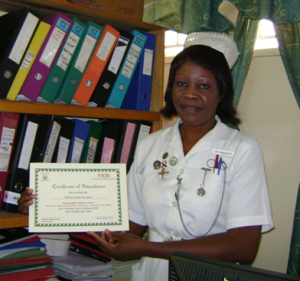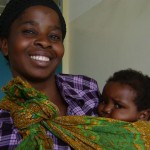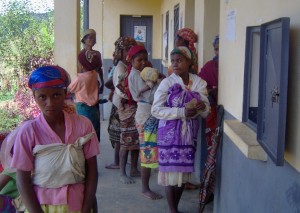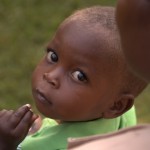New IYCN materials
New IYCN materials
IYCN’s Gap Analysis of Nutrition Coverage in Madagascar (English and French)
Helpful links and publications
IYCN’s recommendations for nutrition monitoring and evaluation resources
Emergency Nutrition Network’s infant and young child feeding in emergencies resource library
PATH’s new resources for diarrheal disease control website
News from our colleagues
The White Ribbon Alliance for Safe Motherhood and CARE launch the Mother’s Day Every Day campaign
Welcome to the first issue of the IYCN Update, a periodic newsletter from USAID’s Infant & Young Child Nutrition (IYCN) Project. Each issue offers updates on the latest research, new resources, and project news.
Research highlights
Iron supplementation for HIV-positive children: health benefit or harm?
A recent Cochrane review concluded that there is an urgent need for randomized controlled trials to determine whether iron supplementation is beneficial or harmful for HIV-infected children. Read more.
How do World Health Organization growth standards impact programs?
In an article published in Pediatrics in January 2009, researchers compared the prevalence of severely acutely malnourished children using World Health Organization (WHO) 2006 growth standards compared to the National Center for Health Statistics cut-off in a Médecins Sans Frontières feeding program in Niger. The authors found a much greater difference in prevalence using the WHO growth standards versus other similar studies. Read more.
Formula feeding a dangerous option in rural Africa
Results from a study in Rakai, Uganda, published in December 2008, confirmed once again that promoting formula feeding for HIV-exposed infants can be dangerous in certain settings. Read more.
Including fathers in breastfeeding promotion
A recent controlled clinical trial in Brazil found that a hospital-based breastfeeding education program for only mothers increased breastfeeding duration, and including fathers in the intervention increased the prevalence of exclusive breastfeeding. Read more.
Point of view
Early HIV testing can be dangerous without support for good infant feeding
In a new commentary on the IYCN website, IYCN’s Jennifer Marcy and PATH’s Kiersten Israel-Ballard examine the impact of early HIV testing on mothers’ infant feeding decisions. They discuss the importance of training health workers to offer appropriate infant feeding counseling for mothers in order to avoid potentially harmful infant feeding choices after negative HIV test results for infants.
Country spotlight: Zambia
Improving infant feeding support for mothers during early HIV testing

Victoria Ndhlovu, a nurse manager at the Kanyama Health Centre in Lusaka, Zambia, displays her certificate after completing an IYCN training course.
Victoria Ndhlovu, a nurse manager at the Kanyama Health Center in Lusaka, Zambia, often thinks about Innocent, a nine-month old baby girl who suffered from severe malnutrition last August. At around the same time, Victoria and her colleagues were surprised to see other severely malnourished babies like Innocent—more than they had ever seen in such a short period.
“We all felt hopeless and sad,” said Victoria. “We weren’t sure how to prevent this from happening to more babies.”
After participating in an IYCN training workshop on infant feeding for health workers, Victoria realized that misinformation from health center staff may have led to the problem. Months earlier, health workers had counseled HIV-positive mothers to stop breastfeeding in favor of formula feeding when their babies tested negative for HIV at six weeks old. But sadly, switching from breastfeeding to formula left the babies vulnerable to malnutrition.
Determined to prevent more babies like Innocent from suffering in the future, Victoria worked quickly to train a group of local volunteers on infant feeding. The volunteers are now working with the health center to offer HIV-positive mothers correct information during infant feeding counseling.
“The community volunteers are critical in our effort to encourage good infant feeding practices and prevent malnutrition for babies like Innocent,” said Victoria.
Project news
Making maternal nutrition a priority in Madagascar
When mothers are malnourished, their babies have a higher chance of suffering from malnutrition. It’s a vicious cycle that nutrition advocates have been trying to combat in Madagascar. Despite national efforts to improve nutrition for mothers and children, malnutrition remains a significant problem that gets passed down through generations.
Now, a promising national Maternal Nutrition Strategy that establishes priorities and key actions toward improving nutrition for mothers may help break the cycle of malnutrition. The IYCN Project has taken the lead on collaborating with the Ministry of Health and other groups to develop the strategy and link it to the government’s broader nutrition plans. Many government officials and nutrition partners believe that the first-of-its kind strategy will provide the concrete guidance they need to make a difference together.
“The new Maternal Nutrition Strategy gives us the missing piece in the plan to fight malnutrition,” said Benjamin Andriamitantsoa of USAID’s Madagascar Mission during a strategy workshop in December 2008. “It will help us break the cycle of malnutrition and address nutrition problems for women well before a child is conceived.”
The Ministry of Health and the National Office of Nutrition plan to adopt the strategy and disseminate it as part of their national nutrition standards in April 2009.
Learn more about IYCN activities in Madagascar.
New activities in Kenya: nutrition support for HIV-positive moms
An assessment in Kenya found that HIV-positive mothers’ feeding practices put their babies at increased risk of HIV infection and other childhood illnesses. To give children a chance for a healthy life, the IYCN Project is now offering nutritional guidance for HIV-positive mothers in Kenya.
In April 2009, the IYCN team will start working with PATH’s APHIA II Western Project to train health counselors in facilities and make sure infant feeding messages are included in community-based HIV/AIDS programs.
Learn more about IYCN activities in Kenya.
IYCN welcomes Tom Schaetzel
We are pleased to welcome Tom Schaetzel as our new technical director. Dr. Schaetzel will lead the project’s technical initiatives and global leadership activities. Before joining our team, he was the nutrition adviser for USAID/BASICS (Basic Support for Institutionalizing Child Survival). He has more than 20 years of experience working on nutrition, health, and agriculture programs addressing infant and young child nutrition, maternal nutrition, micronutrients, and monitoring and evaluation.
Conferences
Join us at the Global Health Council’s 36th Annual International Conference
IYCN’s Rae Galloway will host a panel on new products and effective behaviors to improve complementary feeding for children. View the panelists.
On behalf of IYCN and PATH’s PMTCT Program, Kiersten Israel-Ballard will present exciting new research on feeding HIV-exposed infants in Kenya. Dr. Israel-Ballard’s presentation will be part of a panel moderated by IYCN’s technical director, Tom Schaetzel. Learn more.
Meet us in Beijing: Maternal, Infant, and Young Child Nutrition (MYCIN) Satellite Session at the Second International Meeting of the Micronutrient Forum
May 11, 2009, 9:00 am-12:00 pm
IYCN will join with the University of California, Davis, and the Global Alliance for Improved Nutrition to host “Scaling up Maternal, Infant, and Young Child Nutrition (MIYCN) Programming.” USAID’s Frances Davidson, Health Science Specialist, Global Health Bureau, will chair the session. Read more.
We welcome your feedback and suggestions for our next issue. Please contact: info@iycn.org.
Photos: PATH/Mike Wang, PATH, Agnes Bwalya, CARE, PATH
Date: Mar 6, 2009 | Category: Newsletters



